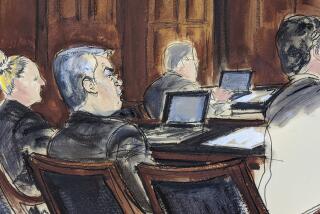Honduras presidential campaign shakes up the status quo
TEGUCIGALPA, Honduras — A new party is challenging the business and political establishment that has ruled Honduras since civilian government took charge a generation ago.
And its candidate is the wife of a former president deposed by those interests in a 2009 coup, a dramatic throwback to years past. One of her opponents is the military general who overthrew her husband.
Such are politics in Honduras, a longtime U.S. ally that has emerged as the prime symbol of an increasingly violent, dysfunctional Central America and now stands as the main transshipment point for Colombian cocaine headed for the United States.
The presidential election on Sunday comes amid a wave of violence in which candidates, judges and journalists have been slain. The bloodshed, combined with the nation’s economic crisis, has propelled more and more Hondurans to flee northward to the United States. Honduran human rights activists have been threatened, especially after testifying in Washington, and the country is badly polarized. U.S. diplomats fear more bloodletting after the vote, which is expected to be close.
“People are voting here with much fear,” said German Calix, Honduran national director of the Catholic charity Caritas, “but also hope that maybe after 32 years of constant frustration, maybe this time it will be possible to break the circle of corruption and impunity.”
Hondurans have a fairly stark choice. A leading candidate is Juan Orlando Hernandez, the all-powerful head of Congress who recently established a military police force to combat the nation’s runaway homicide rate, which makes Honduras one of the most dangerous countries in the hemisphere.
Last year, 20 people a day were slain in a country of 8.5 million residents.
Hernandez, whose tough talk (his campaign slogan: “I will do whatever it takes”) appeals to many, represents one of Honduras’ traditional parties. His National Party and the Liberal Party, both conservative groups, have essentially shared power, year after year, taking turns in the presidency and condemning the country to stilted democratic growth.
The other leading candidate is Xiomara Castro de Zelaya, wife of Manuel Zelaya, the Liberal Party president ousted when he began veering to the left. As head of a new party called Libre (“Free”), she opposes the militarized police force, saying crime can instead be reduced by providing opportunity and social programs. She speaks of “re-making” Honduras by rewriting the constitution, the very mission that got her husband in trouble and inspired his opponents to overthrow him.
Her critics contend she is merely a front for the controversial Zelaya, now 62 and campaigning vigorously for his wife.
Castro had a commanding lead in the early days of the race, but public and private polls more recently reflect a statistical tie with Hernandez. It is illegal to publicize polls for a month before the vote.
Another candidate who has polled well is Salvador Nasralla, a popular sportscaster who formed the new Anti-Corruption Party. There is no runoff in the Honduran election system.
The traditional Liberal Party is a distant fourth in most polls, which some here interpret as punishment for its role in the 2009 coup, undertaken by a group of traditional politicians, businessmen and the military that feared Zelaya was maneuvering to remain in power indefinitely.
Regardless of who wins, said analyst Leticia Salomon of the National Autonomous University of Honduras, the nation’s two-party system will be shattered. And even if Castro doesn’t win the presidency, her party is expected to do well enough to put dozens of supporters in Congress.
Most Hondurans, however, have little faith that the election will be fair, Salomon said.
“The whole system is prepared for fraud,” she said, noting that Hernandez’s National Party dominates the electoral board and the court system that would be the venue for any appeal.
Possibly more than any other country in Central America, Honduras remains a backwater where a few wealthy businessmen and their families control almost the entire economy and government. Also the poorest country in Central America, it remains mired in a banana-republic past, dominated by deadly disputes over land and power and a dysfunctional police and judiciary.
By any measure, Castro and her Libre party represent a challenge to the status quo. She has been telephoning top entrepreneurs to assure them that she poses no threat to their interests. It’s not clear whether they believe her, but she did receive a surprising endorsement from Adolfo Facusse, president of the National Industrialists Assn., who had supported the coup, deemed illegal by the international community.
Honduras was kicked out of the Organization of American States after the coup, and Washington yanked the visas of several prominent Hondurans who supported the removal of Zelaya. An election in 2009 that put Porfirio Lobo, of the National Party, in the presidency only partially restored the country’s international standing.
Many here, on both the right and the left, believe that experience will curb the more disruptive forces that might not agree with the election results. But at the same time, many say the challenge from new parties must be a wake-up call for the traditionalists.
“Even if the National or Liberal parties were to win, and then they don’t put a better government in place, the next election will be out of the question for them,” said Jorge Canahuati, a prominent businessman and publisher of a string of Honduran newspapers. “Things have to change.”
Or, as Calix of the Catholic charity group put it, “This country is drowning. It will be suicide for any party that doesn’t hear the generalized call for change.”
More to Read
Start your day right
Sign up for Essential California for news, features and recommendations from the L.A. Times and beyond in your inbox six days a week.
You may occasionally receive promotional content from the Los Angeles Times.







